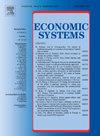The critical role of the health-care sector in promoting employment for women and migrants in the EU. A multicountry input-output analysis
IF 3.3
2区 经济学
Q1 ECONOMICS
引用次数: 0
Abstract
A disproportionate concentration of women in low-pay and low-status sectors is a trend that has grown in significance with the globalization of production systems. For the health and social care sector, this has interesting socio-spatial implications, particularly in terms of immigration, the dimensions of which are worth investigating. This study employs the novel extended multiregional input-output FIGARO database to estimate the employment-generating capacity of the sector in the EU28, with a focus on the gender and geographic origin of its workers. The analysis takes into account both indirect and induced effects and considers both cross-country and cross-sectoral linkages. The findings identify the healthcare sector as a key source of employment for both national and immigrant women in more than half of EU countries. At the same time, this sector contributes to the earnings disadvantage experienced by women, which suggest that equality policies should consider the sectoral distribution of employment.
医疗保健部门在促进欧盟妇女和移民就业方面的关键作用。多国投入产出分析
妇女不成比例地集中在低工资和低地位的部门,这是一个随着生产系统全球化而日益重要的趋势。对于医疗和社会护理行业来说,这具有有趣的社会空间影响,特别是在移民方面,其影响范围值得研究。本研究采用了新颖的扩展多区域投入产出 FIGARO 数据库来估算欧盟 28 国该行业创造就业的能力,重点关注其工人的性别和地域来源。分析考虑了间接效应和诱导效应,并考虑了跨国和跨部门联系。研究结果表明,在半数以上的欧盟国家中,医疗保健行业是本国妇女和移民妇女就业的主要来源。与此同时,该部门也造成了妇女在收入方面的劣势,这表明平等政策应考虑就业的部门分布。
本文章由计算机程序翻译,如有差异,请以英文原文为准。
求助全文
约1分钟内获得全文
求助全文
来源期刊

Economic Systems
ECONOMICS-
CiteScore
4.90
自引率
0.00%
发文量
83
审稿时长
48 days
期刊介绍:
Economic Systems is a refereed journal for the analysis of causes and consequences of the significant institutional variety prevailing among developed, developing, and emerging economies, as well as attempts at and proposals for their reform. The journal is open to micro and macro contributions, theoretical as well as empirical, the latter to analyze related topics against the background of country or region-specific experiences. In this respect, Economic Systems retains its long standing interest in the emerging economies of Central and Eastern Europe and other former transition economies, but also encourages contributions that cover any part of the world, including Asia, Latin America, the Middle East, or Africa.
 求助内容:
求助内容: 应助结果提醒方式:
应助结果提醒方式:


